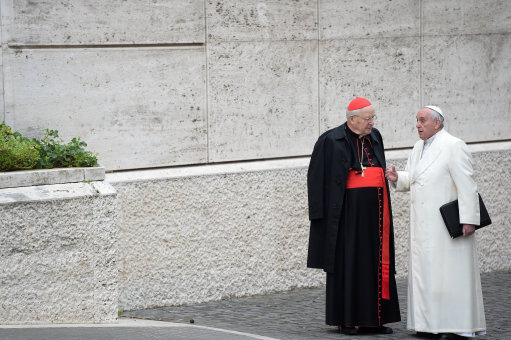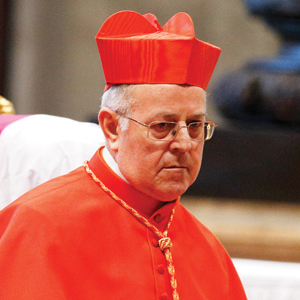Cardinals against Catalonia independence
Less than one month before early elections in Catalonia, two Spanish cardinals have urged Catholics not to support pro-independence movements.
Cardinal Ricardo Blazquez Perez (pictured), Archbishop of Valladolid, and President of the Spanish bishops’ conference, criticised a declaration of independence approved by Catalonia’s regional parliament in October, calling it “serious and disturbing”. Speaking to clergy from across Spain in Madrid last week, he said, “we support the re-establishment of constitutional order”. Spain has imposed direct rule on Catalonia and some Catalan leaders have been remanded in prison or have fled into exile. The 21 December Catalonia elections will replace the region’s parliament.
Cardinal Antonio Canizares Llovera of Valencia added his voice on 29 November, saying that it was “morally unacceptable” for nations to “claim independence unilaterally by their own will”. He said he was “hurt” that many Catalan clergy had backed independence, allowing referendum boxes to be hidden in their churches.
Francis' changes hailed
Pope Francis has changed the Church by putting not only the poor and the marginalised but also the priests who worked with them on the peripheries at the centre of the stage, the new Bishop of Caraveli in southern Peru, Reinhold Nann, said. “Francis has triggered a change – a kind of return to the Bible mandate. Suddenly not only the poor and the outsiders but also the priests who go out to the peripheries find themselves centre stage,” Bishop Nann told katholisch.de while on a visit to Germany.
There had been very few theologians or “church managers” among the 114 new bishops appointed by Pope Francis over the last 12 months when they recently met in Rome, Nann said. “Most of us were practical priests and I – coming from one of the poorest corners of Peru, never felt I was an outsider”. Bishop Nann, a German from Freiburg, worked mainly with young people in the slums of Lima for over 20 years before being appointed bishop.
Putin defends church ties
Russia’s President, Vladimir Putin, has defended his government’s close ties with the Russian Orthodox Church, adding that he counts on Orthodox leaders to help in “preserving Russia’s cultural and historical heritage”. The President was addressing 347 Orthodox bishops at an Episcopal Council, held to mark the centenary of the Moscow Patriarchate’s restoration just after the Bolshevik revolution, two centuries after Peter the Great had suppressed it. He said his government was content to allow the Church “autonomy and independence” in “directly and honestly voicing its views”.
“We expect this co-operation to continue in key fields, such as education and healthcare, preserving cultural and historical heritage, supporting families, mentoring young people and fighting against social afflictions,” Mr Putin added. The four-day Council coincided with the release of new data confirming the Russian Church’s continued expansion. Its eparchies, or dioceses, which now number over 300, are growing at around 10 per year. The Church has 944 monasteries and convents in Russia today compared to just a handful in the early 1990s, as well as around 900 parishes abroad. Mr Putin said he expected Orthodox leaders to counter the “erosion of traditional values”, which was leading other countries towards “degradation, mutual alienation … an increase in radicalism, xenophobia and religious conflict”. Church Primate Patriarch Kirill of Moscow welcomed the closeness of state laws to Orthodox principles, “which grow out of our spiritual and moral tradition, and which the state does not now reject”.
Intersex inclusion
The Rainbow pastoral work group for the LGBT community in the Swiss diocese of Basel, which the Bishop of Basel, Felix Gmür, founded a year ago, now includes intersex people. The Church had up to now concentrated too much only on two sexes, male and female, Susanne Birke, of the Basel Rainbow pastoral group, told katholisch.de. “Wherever we only had two sexes in mind, we will now have to do some correcting and make room for intersex people”, Birke explained. The Rainbow group’s main aim is to sensitise church communities to the problems facing people who do not fit the definition of male or female.
Churches cleared to expand
Twenty-one churches in upper Egypt’s Minya region can restore, expand and rebuild their churches after receiving written approval from the Minya governor. Local sources suggest that Egypt’s President, Abdel Fattah al-Sisi, is keen “to show the US that Egypt is standing with the Christians and that there is no persecution in Minya Governorate”. Most are evangelical churches and the approvals follow several visits by international evangelical delegations to Cairo. However, Coptic churches are still being closed in Upper Egypt. The Coptic Orthodox Bishop of Minya, Anba Macarius, said this week that it was “as though worship is a crime that Copts have to be penalised for”.
Blogger loses appeal
A Vietnamese appeal court has upheld a 10-year prison sentence imposed on the Catholic blogger known as “Mother Mushroom”. Nguyen Ngoc Nhu Quynh (above), 38, was sentenced in June for spreading “propaganda against the state”. A court in Nha Trang denied her appeal last month in a heavily guarded trial that was closed to foreign media.
Kabila urged not to seek re-election
The Catholic bishops of Democratic Republic of Congo have urged President Joseph Kabila not to run for re-election next year. In a statement on 24 November, the bishops reminded Mr Kabila that he was the “guarantor of the constitution”. Although the constitution does not allow Mr Kabila to run for a third term, many people fear he will try to do so. The bishops called on him “to reassure public opinion” that he will not be a candidate “to his own succession”.
City prepares for big Mass
Sydney is preparing for its biggest Mass since Pope Benedict XVI joined international and Australian pilgrims for World Youth Day in 2008, when the Harbour City hosts the culmination of the Australian Catholic Youth Festival on Saturday. Archbishop Anthony Fisher has cancelled Saturday Vigil Masses in his archdiocese to allow people to attend the final Mass of the three-day festival. He is to be principal celebrant at today’s Mass, joined by bishops and priests from across Australia.



 Loading ...
Loading ...